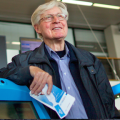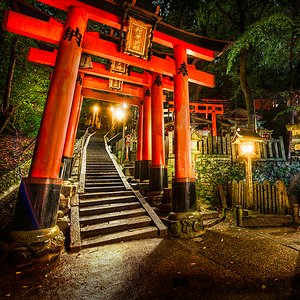Useful Travel Skills

If you’d like to be a traveler, you could learn about history and geography, focusing on what is similar and what is different on this strange, beautiful planet.
You could learn languages, in an attempt to ingratiate yourself and show respect for the culture you’ve dropped in on as an outsider.
You could learn about photography or videography, and find a way to document your memories for others to enjoy from afar.
All these things are fine and useful pursuits. But as you move from aspiring vagabond to global explorer, here are a few suggestions that might help even more.
First, learn to wait.
The life of a traveler is one of delayed adventure. You must accept that there will be many “hurry up and wait” opportunities. You’ll wait for extended, uncertain periods of time at bus stops, train stations, airports, terminals, and more. If at first you’re not good at waiting, don’t worry—you’ll receive plenty of practice. In fact, as you venture further and further to more unfamiliar destinations, your waiting time may actually increase.
Sometimes you’ll sit, but other times you’ll wait standing up. The queue is a faithful companion of the traveler, appearing when you’re trying to leave somewhere (security queue) and trying to get somewhere (immigration and customs). Americans call it a line, Canadians call it a lineup. Whatever you call it, you’ll need to learn to stand in it. When I learned to speak my terrible French, one of the first phrases was On doit faire la queue—one must queue.
If you live your life believing that “time is money,” traveling is not for you. You can try to put some of the waiting time to good use, with books, notebooks, and various Apple accessories, but you must accept that much of your time will be spent doing nothing but waiting. To avoid this, don’t travel.
Second, learn to accept that not everyone has the same logic as you.
You might assume that logic is universal, since it is supposedly based on facts instead of opinions. But you would be wrong, as travelers inevitably discover, and the sooner you learn that logic is inseparably tied to culture and context, the easier your journeys will be.
In some countries people will give you the wrong directions to a place rather than tell you they don’t know how to get there. Does this make sense to you? To me, it doesn’t. If I don’t know how to help someone, that’s what I’ll say. But not everyone thinks like me, and in some cultures, it is embarrassing to say you can’t help someone, so better to give the wrong answer than none at all.
Speaking of help, in some cases people will offer to help you because they want something from you; other times people will go far out of their way to help you while repeatedly refusing any reward. In some cases you may think a problem is small only to find out it is insurmountable (and naturally, the opposite is true). In some cases “no” means “ask three times first.”
How do you learn to interpret different situations and relate them to what is true to you? Well, experience is the best teacher. Unlike waiting, interpreting culture does get easier over time. But first you must understand that logic is hardly scientific.
Lastly, you must learn to reframe your experiences in a larger context.
As you think about why you do things and what you’re working towards, it helps to know why you travel. Are you traveling to find something? To lose something? To be alone? To meet people? Because you are compelled to collect memories the way other people collect clutter?
All these reasons and more are perfectly acceptable. But without a sense of purpose, you may find yourself frustrated, stuck in the traffic and missing the sunset at the beach. Not everything about travel is amazing; in fact, some things are downright unenjoyable. But if a traveler is what you are meant to be, you must learn to reframe and contextualize your experiences.
In this case, reframing means putting a series of encounters in balance. I like a lot of places in the Middle East, from where I’m writing, but I don’t like perpetual jetlag or taxi drivers who rip me off. It takes a long time to get to Jordan and Egypt from where I live, so I’m going to be jet-lagged when I finally make it. Since taxis are the main form of transport around here, I’m going to run the risk of rip-off in those (otherwise great) countries.
So I reframe and think: look out my balcony here in Amman, Jordan. There is a great Lebanese breakfast waiting for me downstairs. Last week I went to Tripoli and ran along the Corniche. I have new countries to go to and old ones that await my revisitation.
And so I learn to be a traveler again, learning to wait, remembering that not everyone has the same worldview as me, and putting it all in perspective. I forget most of the words I learn in various languages, but I try to remember these things wherever I go.
###
Image: Derek








44 Comments
Logic is the same everywhere I think. What differs is what people value. In your example, in some places not losing face by not being able to help is valued more. I’ve always wondered whether in some places people are more overconfident about knowing where things are or more prone to guessing rather than being more prone to just making things up.
Based on your travel style of passing through a country, knowing beyond the pleasantries is probably not worth the effort, but I can testify that speaking the local language has been an incredible asset in my travels and I really hope others try too 🙂
Oh and the only country I’ve ever been given wrong directions in rather than being told “I don’t know” consistently was USA. It seems there is a cultural taboo there of admitting ignorance that we don’t have in Europe.
But it’s true some Asian countries perhaps do this too to save face!
Thanks as always for the many things you talk about on the site Chris. I’ve read from the start and continue to by RSS but only really drop in every few months to comment. The “languages” mention in “travel skills” obviously piqued my interest more than usual this time! 😉
See you in June!
Will there be a book tour stop here in Jordan? I know there are at least a few fans with me here. If you need any help finding or getting to things not in guide books, like locally frequented restaurants or refugee camps, we’re happy to help 🙂 And just make sure that the cab driver turns on his meter, and know that sometimes if the meter says “1500” that means 1.500, not 15.00 JD. A 5 minute ride should cost about 1JD, not 10 :).
The incorrect assumption that logic is universal gets me every time! It’s a tough one to get over and can just drive you crazy. But, without a doubt, the traveler has to get over it.
I like this concept of reframing. Seems like the perfect thing for me to do today to start another week away from home. Thanks!
Oh yes, the waiting in the places where “9am is the latest we have to leave” gets translated into round about 9:30ish.
As a woman you will encounter another set of problems. Some places men will stare at you, snap a picture or try to touch you without consent, but aren’t willing to talk with you unless you are buying something from them. Still I have only had overall positive traveling experiences so far. It really is important that you keep perspective. India, for example was the least relaxing vacation I have ever spent, but the most mindblowing travel experience ever.
There was certainly plenty of hurry-up and wait situations at Central American Borders… It is relatively easy to get yourself in, but I also had to “import” my motorcycle. Wait here, wait there, go photocopy this and that, wait some more. My longest wait was 6-hours Leaving Guatemala for El Salvador, though I have heard of several travelers waiting days!
The cross-border truck drivers had the waiting skills down! The carried small stools to sit on while waiting in the queue, and hammocks to string underneath their trucks/lorries in the shade!
What a wonderful thing to ponder: “understand that logic is hardly scientific.” It is wonderfully freeing when we stop insisting that everything must be done in accordance with our own “logical” rules. When we spend more time ALLOWING instead of INSISTING we make our way through everyday with more peace and clarity.
The great part about waiting when traveling is that it doesn’t have to be waiting…it can be observing. While standing in a line might be boring in a South Dakotan post office, waiting at a Tanzanian post office is a fascinating anthropological experience. While we should be able to observe and learn while waiting at home, we don’t. It’s too normal, but I love moments of pause while traveling because there is so much to see.
this is such a great article, and every word of it true. I am very relieved to hear that you are not doing your waiting in Tripoli right now…
Great reflective piece. I travel alone for all of the reasons you mention including the seemingly contradictory ones such as being alone and meeting people. Solo travel allows me to do either whenever the mood strikes. But I also travel a lot for another reason…don’t have the words for it, but some of us have always felt different, marching to the beat of a different drummer and perpetual travel feeds that sense in a good way rather than in the alienated way I often feel in my home country. I love your bit about logic and directions. Especially in the mideast, no one is going to say they don’t know. Usually a crowd gathers and they all discuss the location I’m trying to reach. I’ve become adept at knowing when they are making it up and when they are thinking. Here in Ecuador, everyone agrees with me–about everything! Serious discussions with doctors and lawyers lead to them agreeing with everything I say so I’m still not sure my visa application or dog meds are correct!
PS So envious that you are in Jordan, one of my favorite countries. Don’t miss Petra–it was a peak travel experience.
Great article.
One of my favorite travel logic experiences happened at an ice cream shop in Mumbai. They only had single scoops on the menu, but I ordered a double. “Not possible” I was informed by the man behind the counter. “Not possible? Even if I buy two ice creams?” “Not possible.”
Ah well, it was a one scoop day.
Learning to wait — so true!!!
I am so relaxed about this now and it was many hours and sometimes days of waiting whilst travelling that taught me this valuable skill.
Reframing is also an excellent way to express taking that step backwards to realise just how things are ad not get caught in the moment.
Like Kerry glad to hear Tripoli is already done and dusted as maybe not the most inviting situation right now…
If only there was an easy way to know when we’re making giant assumptions based on our cultural logic. Briana’s ice cream example so perfectly summarizes this conundrum. Sure, this type of “logic” makes our lives easier in the short run, but I often wonder what we miss out on as people because we assume our “logic” is the universal Truth with a capital “T” instead of a more personal truth. There is a difference. I’m not sure there is such a thing as universal “Truth” or universal Logic.
Chris, if you are in Jordan at the moment, PLEASE don’t miss snorkelling in Aqaba. Please, please, please!! We were at a place called Coral Bay Resort where we hired gear. Off the jetty, you are transported to a underwater miracle… I was amazed that the whole world wasn’t snorkelling there!! Enjoy!
Tripoli is my dream city! You’re awesome!
This reminds me of some great advice from Eckhart Tolle. He reminds us that we do not derive enjoyment from activites – Rather, we either bring our enjoyment or not…if not, we can bring our acceptance or, more than enjoyment, our sense of genuine enthusiasm.
Travel taught me that I cannot control everything. I will wait and be patient, even if I thought I had a scheduled. I now enjoy my time alone in airports waiting for the next leg in journey.
What I find amusing in myself is that I can be the most impatient person in the world – at home. But traveling? Suddenly I am the most serene and untroubled person. Wait in line at the train station? Not a problem, I have a book. Bus stopped at some rest stop for an hour or more? No problem, there’s a shop and some beautiful scenery. And on it goes. I only start to get impatient again the day before it is time to come home. Hmmm. That should tell me something!
I relate to everything you’ve said in this post, Chris, because most of these issues and situations have come up in my travels. I believe the travel skills you describe actually make us kinder, more patient, more open-minded people when we return home. I remember once standing in line at the airport in Bangkok, listening to an American man shouting at a Thai woman who was trying her best to help him, but who couldn’t provide him with the answers he wanted. She remained calm, polite, and apologetic, while he continued to rant. As he stalked away, he declared to me, “These people have a lot to learn about service.” I thought, “And you, sir, have a lot to learn about manners.” I then walked up to her window and handed her my passport, which was still soaking wet because I’d jumped into the Maekong River the day before, forgetting I had it in my pocket. She dangled it from two fingers as I explained and we both laughed.
I am listening to a BBC program (on public radio) about the mayhem in Tripoli, Libya, and find it remarkable that just last week you were jogging there. Was there any foreshadowing of the events to come?
And now you are in Jordan. Surely the recent and continuing events in the area of the world you are traveling in warrant some commentary from you. It doesn’t need to be political, but I trust you to give us a unique birds-eye view of how such unrest is affecting your travels, and “what it all means” for your fellow travelers.
The point I am interested in after this post: Did you really go to Tripoli last week? Did you notice any rumors there already?
Isn’t it fantastic that we live in a time when we can so easily travel to the farthest corners of the world. Places that once only appeared as exotic locations in National Geographic are destinations we simply click on then arrive in a few hours later.
From my perspective this is mind blowing.
My parents never ever went OS, I’m not sure they had the desire but even if they did air travel was prohibitively expensive for them. Plus even to cross the Channel from the suburbs would have required the most enormous mental shift.
That’s where we come in.
We possess the ability to make all those shifts with ease.
So it’s our job to look patiently for the similarities after we’ve noticed the differences and to report back, in our own way, to promote understanding and peace in this world. I dream that one day there will be no borders……………………… ONE WORLD.
Peace!
What a great attitude refresher. How about applying this to the daily routine…one’s own commute, workday, home and business? Not insisting that everyone else’s logic mirrors your own?
I loved this post as it brought back many memories and reminded me of lessons learned. I had the privilege of living overseas for a few years and the greatest gift during that time was the expanding of my mind to include the perceptions of so many people of various cultures. It changed my view of the world
It also led me to one other shocking realization – not all cultures believe in queuing up! It honed my observation skills and reminded me to ‘go with the flow’.
I am also a fan of traveling to be a lone AND to meet people.
I am also glad you went to Tripoli last week instead of this week.
Good luck with the next step.
Excellent post Chris. You get to learn those things and deal with it better with experience but at first it is frustrating sometimes. There isn’t one universally way to think even if something is entirely logic to you. For myself, a westerner problem solver and action-oriented, acceptation and waiting is still something I’m struggling and learning how to deal with.
It makes me remember about one wise and nice quote:
God give me the strength to change the things I can.
The courage to accept the things that I cannot.
And the wisdom to know the difference …
Cheers!
From what I can read above I assume that by travelling people become more humble, patient and respectful. Everywhere they go they are guests. I am wondering if any of your read anything from Kapuscinski who was a Polish reporter and traveller. He wrote a lot that by travelling we should always pay attention to local traditions and respect that people may have different logic.
hehe…! Traveling is like living with a large family in a small house. I’m an only child and even then you have to learn to wait, understand that your parents are from a different time zone and maybe even culture, and at the end of the day, put all your squabbles into perspective! 😀
A little off the subject. I am thinking of traveling around the world this coming fall and would like to know how people handle the health insurance end of it.
This is a great blog post, really quite profound. In so many ways it’s about noticing — not just our environment, but the culture we’re in, the people we’re around, and especially what’s going on inside ourselves. I was once stranded in an airport for four days (without clean underwear or socks which was actually the most horrifying thing of all) and although I was wild-eyed and sleep deprived (I didn’t know until then that airports NEVER turn their lights off), I became fascinated by my reactions to things: unusually calm in long lines for food, despondent when US Air wouldn’t give me a cheap travel pillow upon which to lay my head while sacked out on the floor. Travel is wonderful, but fraught with unknowns — unknowns that can turn into great teachable moments.
Jordan and Libya… and you mentioned Egypt too. Are you chasing revolutions?
Chris, isn’t that why travel is fantastic? We learn tolerance and acceptance once we get out of our comfort zone. I think travel is the solution to so many problems in life, including raising teenagers.
Larry, when I’m going on shorter trips, I tend to play the odds and not bother with extra insurance. However, when I went on my trip around the world and when I spent 7 weeks in Africa, I sprung for some low-cost traveler’s insurance. I went with TravelGuard. I can’t vouch for how great their service was, because luckily I didn’t need to use it. However, they offered what I wanted at a reasonable price, and what I wanted was a promise that if I had a catastrophic accident or illness in some remote area that they would take care of the red tape & I wouldn’t go bankrupt if I had to get airlifted out. There are several companies that do this, and nowadays there are so many travel bloggers online, I’m sure you can find someone to offer an opinion on how they compare.
Thanks for the post. It’s reminded me of some glorious moments on the road.
Like in Laos, someone parked a JCB in the middle of a main road, which was really a mud highway, between two (for Laos) big towns. An hour and a half later, the driver turned up as if nothing was out of order, apparently he had dinner and a nap. But the most remarkable thing was the build up of traffic – three cars! Also we were surrounded by lush jungle.
And people treat you differently too. In Taiwan, they seem too helpful, it’s almost embarrassing. And I think, would people help foreigners back at home? Where to me, they seem to spend most of the time complaining about foreigners. I try and take the lessons I learnt from Taiwan and when I see anyone that needs help I go over and help (but I don’t do this everytime).
Your posts always make me answer the deeper questions of life and why I’m doing what I’m doing. I’m soon taking my first trip outside of North America- to the Middle East actually- and I’m really looking forward to learning the lessons of long term travel. Bring on the lines, new logic, and taxi drivers!
Visiting countries where history is currently unfolding, eh? Enjoy, be safe!
As usual, a really good post, Chris. I can feel where you are at, what you are doing, and how attitude and purpose affect everything for a traveler.
I’ve been trying to sort out why traveling is such a big deal for me. Your thoughts are quite helpful in that process. My wife and I did a 7 month tour of 50 national parks last year, driving over 35,000 miles. We’re still sorting through the “why” of such travel, what it means to us, and how to do more of it.
What you say is true whether in foreign countries or different states in the union, with some obvious exceptions. Keep up the good work, enjoy your immersion back into the world of travel, and safe homecoming to you when you are ready.
We are new to the travel lifestyle and are traveling by sailboat, currently in the Bahamas. Hurry up and wait applies to waiting for a weather window, waiting for the mail boat, waiting for wifi. This is the first country in a trip that we hope takes us around the world. The Bahamian people will be a difficult act to follow — from the city of Nassau to the smallest cays (keys to those in the U.S.) the folks here are friendly, helpful, and a delight to talk to.
I defiantly am well acquainted with the art of waiting. Sometimes I feel delays just follows me around. My last 4 trips have been struck with several hours delays and even spending a night in the lovely airport of Helsinki.
I’ve learned to accept it, since there’s nothing else I can do. Getting emotionally worked up over a situation that is out of my control, is just pure waste of energy. Instead I use the delays to explore and spend a few extra hours in the city or wherever I am. Read a book or do some extra work on my laptop.
Interesting article. I couldn’t help but smile when I read this –> “In some cases “no” means “ask three times first.” In my country, the Philippines, this is particularly evident. Perhaps it is because of the fear of appearing to be too eager to say ‘yes’ in case someone says, “Would you like to eat?”…or Perhaps it could be because the first offer is just out of courtesy…but if it is repeated many times over…and with a little bit more prodding…it means the host really means it. Which, of course, leads to a lot of confusion because in the end you’re still not sure if it is really a no or a yes. One trick is to ignore the words…but instead “feel” what the other person really mean about what he said. 🙂
Cool post. Waiting and not waisting time while doing it, is a good skill to but on practice in everyday life also. And while waiting it gives a good change to meet new people.
Patience is an amazing virtue, isnt it?
Thanks for the article Chris, a great reminder of what comes with travel.
I would add:
Zeroth: Be extremely nice, smile to people, thank for every small insignificant little thing someone does for you. Be pleasant and people will be pleasant for you.
“Thank You, it’s so nice of you!”, [smile] – that’s the lubricant which will make your journeys much, much smoother and pleasant.
Your comments are welcome! Please be nice and use your real name.
If you have a website, include it in the website field (not in the text of the comment).
Want to see your photo in the comments? Visit Gravatar.com to get one.